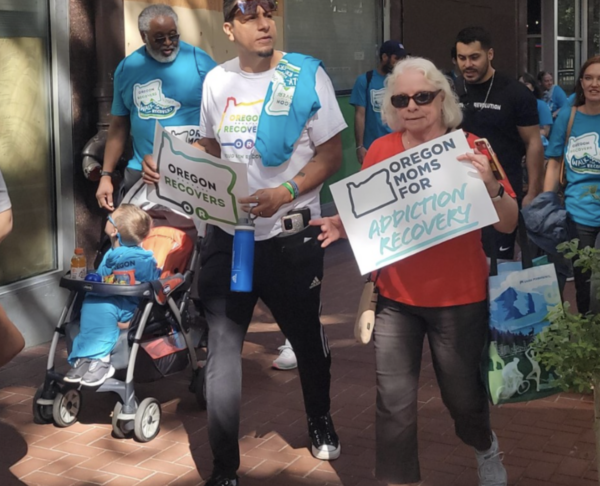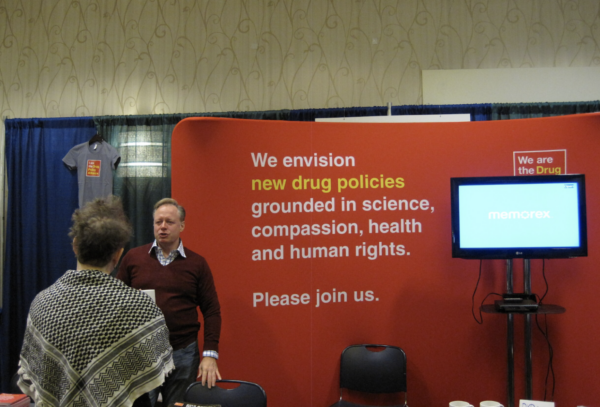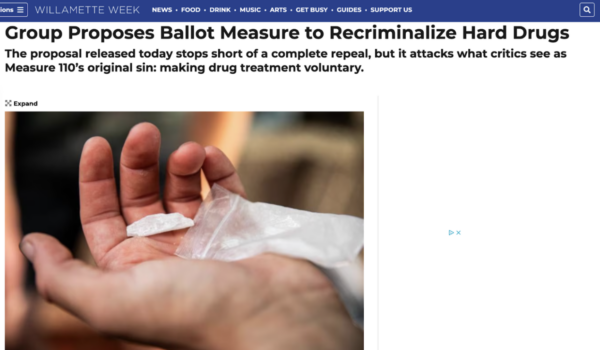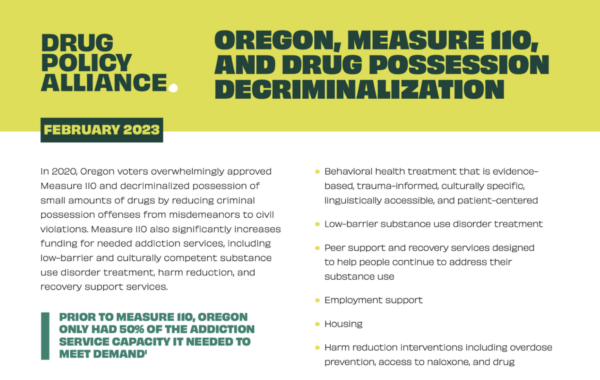 “Is it working?”
“Is it working?”
That’s the million dollar question about Oregon’s grand decriminalization experiment.
Certainly the rest of our country, and likely the world, is watching with interest to see how the ramifications of Measure 110 will pan out for our state.
In this post, we’ll dive into what we know about Measure 110, how it functions today and how it’s likely to function in the future. We’ll set aside some of the more meaningless rhetoric and stigma surrounding the measure and dive into the pros and cons of what we see in Measure 110 as addiction treatment professionals who are dedicated to an evidence-based approach to health care as well as public health.
First, what is Measure 110?

Oregon’s Drug Addiction Treatment and Recovery Act – aka Measure 110 – was passed by Oregon voters in November 2020.
Measure 110 provided for the decriminalization of small amounts of any illicit substance in Oregon. It established a hotline that people ticketed for possession must call to receive referrals for addiction treatment.
Importantly, the bill itself did NOT provide for major expansion to Oregon’s sorely lacking behavioral healthcare system.
Measure 110 Appears to NOT be Working – But There May be More than Meets the Eye
Champions of Measure 110 held the act up as the vanguard of a more humane and reasonable approach to fighting the disease of addiction. Rather than criminalize people for a disease they did not choose, Measure 110 is intended to keep vulnerable people out of the criminal justice system and divert them into a behavioral healthcare setting instead.
After all, the thinking goes, people with SUD need treatment, not punishment.
That was the theory.
As an aside, that theory is absolutely supported by the research. People with substance use disorder have a disease and every single patient at Shanti Recovery and Wellness, for example, deserves compassion and treatment, never punishment or stigma.
However, Measure 110 in practice appears to be somewhat different.
With decriminalization has come a significant rise in overdose deaths in our state. We see more – not less – people visibly suffering from behavioral health concerns on our streets. The Measure 110 hotline gets ludicrously few calls. Police officers have all but ceased handing out futile Measure 110 tickets. It’s still nearly impossible to secure a treatment bed within a reasonable amount of time for people with SUD in Oregon.
Many voters who once backed Measure 110 have concluded that they made a mistake. Have they?
Some lawmakers are calling for recriminalization. Is that the logical response?
Measure 110 is Not Responsible for the Surge in Overdose Deaths in Portland and Beyond

Let’s set a few facts straight.
For one, researchers have proven that while it appears that decriminalization has caused a surge in overdose deaths, the two are, in fact, not linked. Many states have experienced a similar surge in overdose deaths – with and without decriminalization.
Instead, researchers have found that a nation-wide surge in fentanyl distribution is to blame for the sudden increase in overdoses in Portland and beyond. Fentanyl is much more deadly than heroin and it’s much easier to unintentionally overdose on the drug.
The timing is certainly regrettable, but it’s important to remember that correlation is not the same as causation here.
Measure 110 is a Starting Point, Not a Destination
Though Measure 110 isn’t responsible for the sudden surge in fentanyl distribution in Portland or Oregon, it seems that most of us can agree that Measure 110 is, at best, a starting point for a better destination.
The bill as drafted overlooked some important issues, namely:
- There’s nowhere near enough addiction treatment services in Oregon
- An impersonal hotline is an ineffective mechanism for addiction treatment referrals
- Police are perhaps not the best ambassadors for the recovery community
- Public consumption of illicit substances will continue unless viable alternatives are provided
- People with SUD usually do not “magically” recover without sustained support. It’s not simply a matter of “wanting help” or “not wanting help.”
- Many leaders in the recovery community were vehemently opposed to Measure 110 and readily saw the shortcomings of the bill long before it was passed. Perhaps it should have been our amazing local recovery community, and not out-of-state wonks, that informed the public on the best solutions to our state’s addiction crisis.
- Addiction is, in fact, a complex disease that requires a comprehensive response on many fronts
Measure 110 Can Certainly Do With Some Revisions – But Which Ones?

While there are many opinions on how to “fix” Measure 110, we were particularly impressed with one Oregon Live editorial written by Teri Morgan-Urie and Tony Morse.
In it, the authors have some interesting suggestions for improving accountability and encouraging recovery without involving SUD patients in damaging, long-lasting criminal justice system involvement.
For example, the authors suggested:
- Expanding funding for treatment, prevention, harm reduction, peer services, and recovery housing in the state.
- Allowing officers to confiscate illicit substances from, but not arrest, those found carrying drugs.
- Making it a misdemeanor offense to be caught with drugs five times in one year.
- Automatically expunging that misdemeanor from the record upon completion of an addiction treatment program.
These alterations to Measure 110 come with major – and perhaps fatal – downsides, of course. Any involvement with the criminal justice system can cause or exacerbate trauma, especially for marginalized communities. Involving the police officers in behavioral health matters can easily escalate an otherwise peaceful, non-life-threatening situation. Patients with a dual diagnosis are particularly vulnerable to dangerous police escalation.
Measure 110: Which Way Forward?
At Shanti Recovery and Wellness, we are humble enough to know that we don’t have a magic bullet for “fixing” the addiction crisis in Oregon. Short of a massive and immediate infusion of an incredible amount of capital into Oregon’s harm reduction, peer support and behavioral healthcare system, there are no easy answers here.
What we do know is this: evidence-based treatment is available, and it works. Recovery is possible. We see it in our clinic every day. We don’t have control over what voters decide to do with this urgent public health concern, but we will continue to focus on building the recovery community, one journey at a time.
Looking for MAT, Suboxone, or Buprenorphine for Addiction Treatment or Opioid Use Disorder Treatment in Portland Oregon?
At Shanti Recovery and Wellness, we understand how difficult it can be to seek treatment for SUD. We are committed to reducing barriers to treatment for addiction treatment patients in Portland, Oregon and beyond.
Interested to learn more about how we can help? Give us a call today to begin your journey to freedom from addiction.
